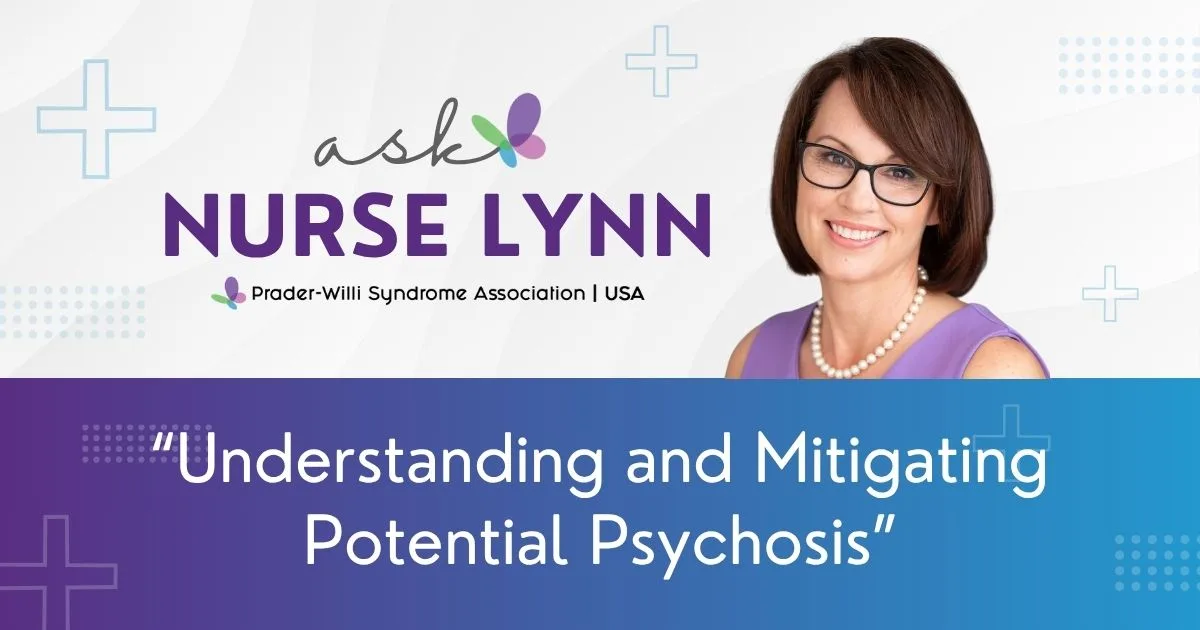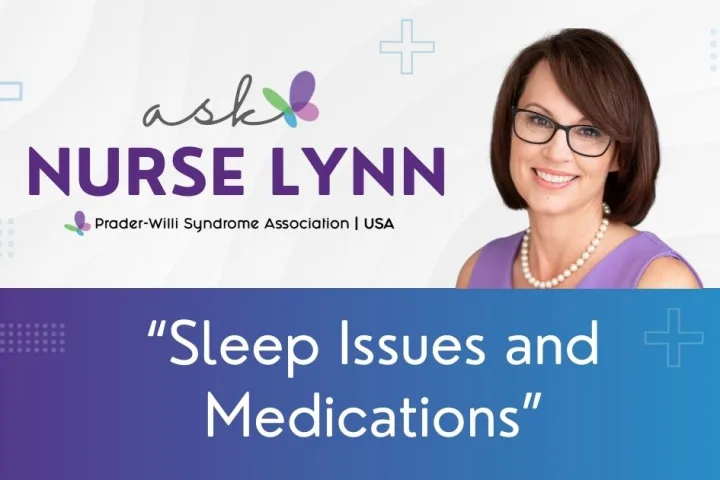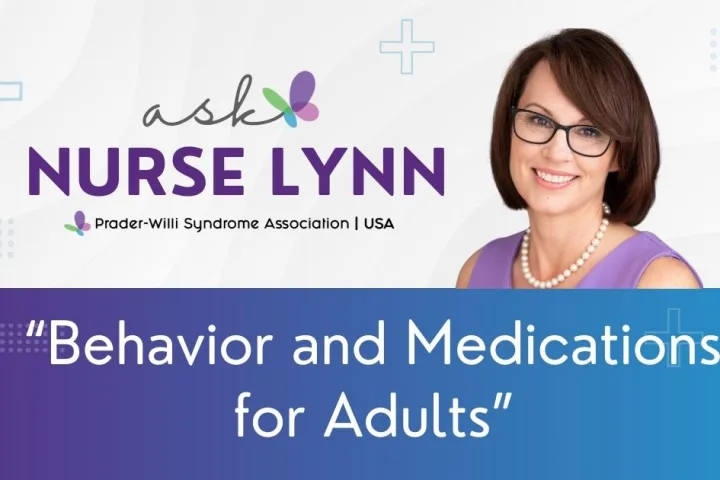Question:
Female, 6 years old, UPD subtype
We have seen a lot of information about PWS patients with UPD having a higher risk of developing psychosis typically by age 20. We have recently put our daughter into a mental health/behavioral therapy program where she will meet with a therapist once a month. This way as she gets older and starts to learn more about her conditions, she has a secondary safe place to discuss her emotions and have help to work through her problems. Are there other preventative measures we can take to possibly push back the age of onset for psychosis or keep it away all together…. Or is this more dependent upon genetics, as to whether or not it will occur?
Nurse Lynn’s Response:
You’re doing something incredibly important by starting behavioral therapy early with your daughter. This type of support can make a significant difference, especially for children with Prader-Willi Syndrome (PWS). For children with the mUPD subtype, the risk of developing psychosis in late adolescence or early adulthood is notably increased. This heightened risk is partly due to how certain genes are expressed in the brain, affecting mood and cognition. However, risk does not equal certainty. A supportive environment, early emotional development, and proactive care can all help delay or even prevent serious mental health issues.
Therapy provides your daughter with a safe space to explore her feelings and learn healthy coping mechanisms as she grows. As she becomes more aware of her condition, having a trusted person to talk to will be especially beneficial. Helping her build a healthy identity—one that includes PWS but is not solely defined by it—can reduce the internal stress that sometimes contributes to mental health challenges. Approaches like mindfulness, breathing techniques, yoga, and sensory regulation activities (such as deep pressure or heavy work) can also aid emotional regulation over time. Alongside therapy, supporting her emotional literacy—helping her name and understand her feelings—can have a significant impact. Simple tools like feelings charts, drawing, or social stories can make this process both engaging and age appropriate.
It’s also important to stay alert to early signs of emotional or behavioral changes. In children with mUPD, early warning signs of mental health shifts may include social withdrawal, anxiety, difficulty sleeping, obsessive thinking, or mood swings. Tracking these behaviors over time and sharing them with her care team can help catch issues early. Hormonal transitions—particularly during puberty—should be carefully managed with her endocrinologist, as they can greatly affect mood and psychiatric stability.
Sleep health is another critical aspect. Supporting healthy sleep habits is essential for emotional regulation, memory consolidation, and cognitive processing. In individuals with PWS, these areas are already challenged due to underlying neurodevelopmental differences, and sleep disturbances can often precede or trigger psychiatric episodes.
In addition to therapy and home routines, school support is equally important. Working with teachers to offer emotional check-ins, quiet breaks, or structured transitions can help maintain stability across settings. At home, a predictable daily routine can provide your daughter with a sense of security—especially during times of stress or change.
Involving the whole family is also valuable. Educating siblings and caregivers about what to watch for and even participating in family therapy or parent support groups can strengthen your ability to respond as a team.
Helping your daughter form meaningful social connections in safe, supportive settings is another key protective factor. While safety should always be the priority, avoiding over-isolation is just as crucial for her emotional well-being. Encouraging friendships and guided peer interactions can help her build confidence and resilience.
While there is currently no medication proven to prevent psychosis in PWS, taking care of her overall health—particularly sleep, nutrition, and hormone balance—can support brain development. Monitoring lab values, managing stress, and maintaining consistent routines are all part of this holistic approach.
Biologically, the increased risk for psychosis in mUPD comes from the overexpression or absence of certain genes. This imbalance can affect brain chemicals and connections in ways similar to conditions like bipolar disorder or schizophrenia. Because of this, it’s important to stay vigilant during the teenage years. Warning signs to watch for include hallucinations (seeing or hearing things that others don’t), strong paranoid beliefs, sudden mood shifts, extreme confusion, or agitation. Early recognition and intervention are crucial.
Ultimately, while we can’t eliminate the genetic risk, the actions you’re already taking—early therapy, emotional education, family involvement, and close monitoring—are powerful tools. Together, they can help your daughter build the emotional strength and support system she needs to thrive.
Do you have a non-emergency medical question for Nurse Lynn? Submit your question here:
Share this!





 Perry A. Zirkel has written more than 1,500 publications on various aspects of school law, with an emphasis on legal issues in special education. He writes a regular column for NAESP’s Principal magazine and NASP’s Communiqué newsletter, and he did so previously for Phi Delta Kappan and Teaching Exceptional Children.
Perry A. Zirkel has written more than 1,500 publications on various aspects of school law, with an emphasis on legal issues in special education. He writes a regular column for NAESP’s Principal magazine and NASP’s Communiqué newsletter, and he did so previously for Phi Delta Kappan and Teaching Exceptional Children. Jennifer Bolander has been serving as a Special Education Specialist for PWSA (USA) since October of 2015. She is a graduate of John Carroll University and lives in Ohio with her husband Brad and daughters Kate (17), and Sophia (13) who was born with PWS.
Jennifer Bolander has been serving as a Special Education Specialist for PWSA (USA) since October of 2015. She is a graduate of John Carroll University and lives in Ohio with her husband Brad and daughters Kate (17), and Sophia (13) who was born with PWS. Dr. Amy McTighe is the PWS Program Manager and Inpatient Teacher at the Center for Prader-Willi Syndrome at the Children’s Institute of Pittsburgh. She graduated from Duquesne University receiving her Bachelor’s and Master’s degree in Education with a focus on elementary education, special education, and language arts.
Dr. Amy McTighe is the PWS Program Manager and Inpatient Teacher at the Center for Prader-Willi Syndrome at the Children’s Institute of Pittsburgh. She graduated from Duquesne University receiving her Bachelor’s and Master’s degree in Education with a focus on elementary education, special education, and language arts. Evan has worked with the Prader-Willi Syndrome Association (USA) since 2007 primarily as a Crisis Intervention and Family Support Counselor. Evans works with parents and schools to foster strong collaborative relationships and appropriate educational environments for students with PWS.
Evan has worked with the Prader-Willi Syndrome Association (USA) since 2007 primarily as a Crisis Intervention and Family Support Counselor. Evans works with parents and schools to foster strong collaborative relationships and appropriate educational environments for students with PWS. Staci Zimmerman works for Prader-Willi Syndrome Association of Colorado as an Individualized Education Program (IEP) consultant. Staci collaborates with the PWS multi-disciplinary clinic at the Children’s Hospital in Denver supporting families and school districts around the United States with their child’s Individual Educational Plan.
Staci Zimmerman works for Prader-Willi Syndrome Association of Colorado as an Individualized Education Program (IEP) consultant. Staci collaborates with the PWS multi-disciplinary clinic at the Children’s Hospital in Denver supporting families and school districts around the United States with their child’s Individual Educational Plan. Founded in 2001, SDLC is a non-profit legal services organization dedicated to protecting and advancing the legal rights of people with disabilities throughout the South. It partners with the Southern Poverty Law Center, Protection and Advocacy (P&A) programs, Legal Services Corporations (LSC) and disability organizations on major, systemic disability rights issues involving the Individuals with Disabilities Education Act (IDEA), Americans with Disabilities Act (ADA), and the federal Medicaid Act. Recently in November 2014, Jim retired.
Founded in 2001, SDLC is a non-profit legal services organization dedicated to protecting and advancing the legal rights of people with disabilities throughout the South. It partners with the Southern Poverty Law Center, Protection and Advocacy (P&A) programs, Legal Services Corporations (LSC) and disability organizations on major, systemic disability rights issues involving the Individuals with Disabilities Education Act (IDEA), Americans with Disabilities Act (ADA), and the federal Medicaid Act. Recently in November 2014, Jim retired.